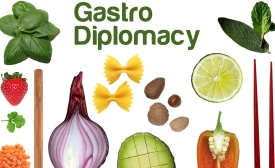gastrodiplomacy

The latest edition features the emerging role of food in public diplomacy and how national cuisine can facilitate cultural dialogue.
On a warm summer morning earlier this month, dozens of building workers were putting the finishing touches to the restoration of Casa Moreyra, a 17th-century colonial manor house in San Isidro, the business district of Lima, Peru’s capital. With an investment of $6m, Casa Moreyra is the new home of Astrid y Gastón, a restaurant ranked 14th in the world by Restaurant magazine.
What makes a city "cool"? If it means being loaded with atmosphere, charm, great food and nightlife, yet ignored by the bulk of travelers, then Lisbon deserves consideration as Europe's coolest capital. Here's why.
The kitchen of Pope Francis’ Vatican residence was made kosher for a day last week, as the pontiff hosted a delegation of rabbis from his native Argentina. The gesture was a sign of the close personal relationship between Francis and the Jewish community, and continued efforts to strengthen the institutional relationship between Jews and the Church.
Traditional Japanese cuisine, known as washoku, is now an intangible cultural heritage, according to the United Nations. Tofu, mochi and miso are a few examples, but it's the buckwheat noodle, or soba, that many consider the humble jewel of Japanese cuisine. It's not easy to find in the U.S., but one Los Angeles woman is helping preserve the craft of making soba.
Over the past few decades, it has become possible to speak of a "global food system"—shorthand for the trade patterns, shaped by multinational companies, that move raw agriculture commodities and processed food across borders. Yet as this fascinating new Oxfam study shows, there are still huge differences in people's experience of food across the globe. Oxfam ranked nations on four criteria: whether food exists in plentiful supply, whether it's broadly affordable, whether it's of good quality, and whether it's causing high rates of obesity and diabetes.
Chefs Harris Salat and Tadashi Ono both own Japanese restaurants in New York. Together, they've written a cookbook called "Japanese Soul Cooking." It's not about fancy stuff like sushi, but rather, Japanese comfort food - things like gyoza, soba, tempura - and curry.
In the elegant silence of a narrow street near the River Seine, David Moyal takes a breath of fresh winter air and enters a noisy restaurant in the French capital. Inside Miznon, he is transported to another world, filled with the cacophony of Hebrew voices and Israeli music. A bustling new bistro that Moyal runs in the 4th arrondissement, Miznon is becoming hugely popular with Israelis and French Jews thanks to its Tel Aviv feel and audacious mission to pack Paris into a pita.







